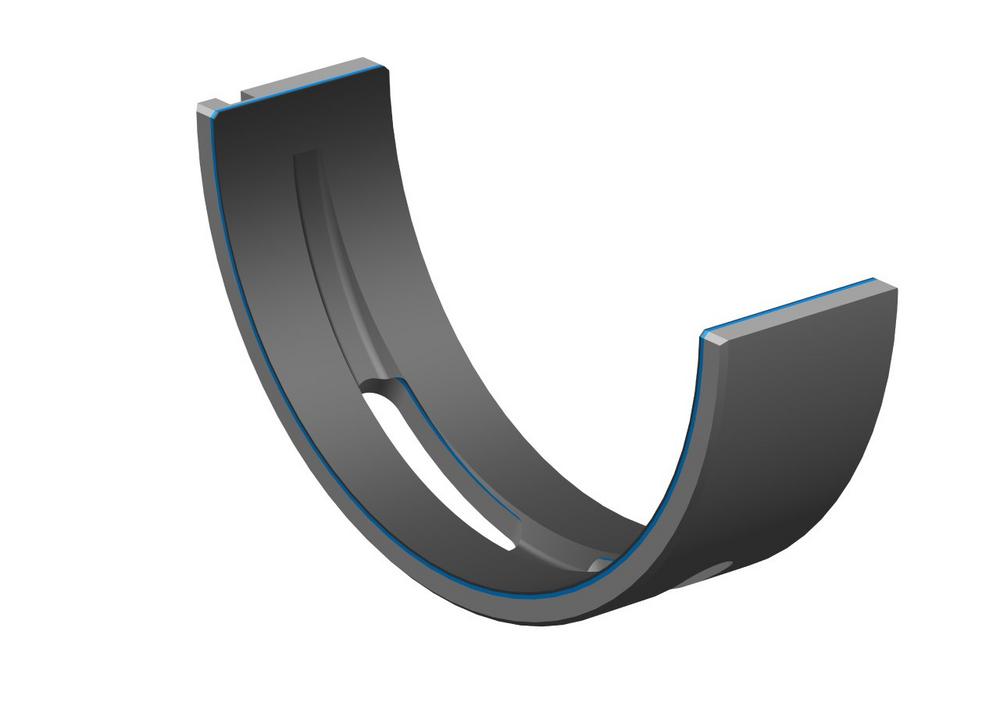If tougher legislation regarding a reduction in CO2 and particle emissions is to be addressed, I.C. engines must become even more efficient. Besides those enhancements made possible by improving the I.C. engine itself, the various stages of engine hybridization play an essential role. The first hybridisation step took the form of a moderate start/stop strategy and increased ignition pressure. The next stage, whether in the form of mild hybrid strategies or sophisticated plug-in hybrids, raises the number of start/stops during a vehicle’s lifespan from previously 400,000 to over a million. In conjunction with belt-driven 48-volt starter/generators, this leads to a considerable increase in belt forces on the crankshaft bearings. This, in turn, results in a massive rise in mixed friction at these bearings while due to even lower-viscosity oils, the conrod bearings, too, are likely to be exposed to increased mixed friction.
Newly developed KS R53L1 polymer for wear-resistant crankshaft bearings
KS R53L1 is a polymer bearing further developed by KS Gleitlager for crankshaft applications. Even under the most unfavourable mixed-friction conditions it still assures excellent wear resistance with no loss in other important properties such as robustness and coefficient of friction. In the case of high mixed-friction, wear is reduced by up to 80 percent compared with first-generation polymer bearings. The proven R53 -material acting as substrate beneath the polymer layer, provides added robustness thanks to its special dirt tolerance.
With its dynamic load capacity combined with the adaptability of the polymer layer, the bearing can be used as crankshaft bearing on all mild or plug-in hybrids, gasoline or moderate-performance diesels – and in combination with low viscosity oils.
Polymer KS R55L1 for hybrid gasoline conrod bearings
For conrod applications, the manufacturer combines the new L1 polymer layer system with the more resilient R55 two-layer-material substrate. On medium- to high-duty gasoline engines, the new KS R55L1 provides the wear resistance required on full hybrids and low oil viscosity applications, with no compromise in the robustness and adaptability so important on conrod bearings. Thanks to the interaction between polymer layer and bearing material in the substrate, the system’s dirt tolerance is still very high.
Polymer bearings help keep friction to a minimum
With the use of low-viscosity oils and the surge in start/stops, both conrod and crankshaft bearings spend more and more of their working lives in a condition of mixed friction. Thanks to the proven solid lubricants MoS2 molybdenum disulfide and graphite already featured on the first generation of polymer bearings, the new polymer bearings KS R53L1 and KS R55L1 demonstrate a low coefficient of friction throughout the entire mixed-friction range. This is an additional contribution toward reduced crankshaft friction losses and hence lower fuel consumption and emissions.
Rheinmetall Automotive AG
Karl-Schmidt-Straße 2-8
74172 Neckarsulm
Telefon: +49 (7132) 33-3140
Telefax: +49 (7132) 33-3150
http://www.rheinmetall-automotive.com
Pressereferentin
Telefon: +49 (7132) 33-3142
Fax: +49 (7132) 3352140
E-Mail: Manuela.Schall@de.kspg.com
